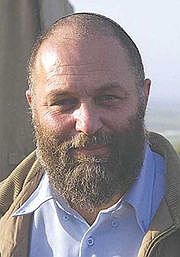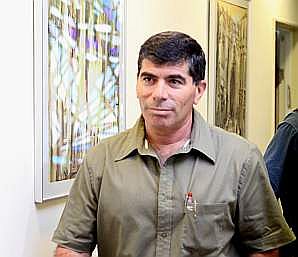

“This platform, which proved itself more than once in the past, is made up of thousands of combat troops, combat supporters, and headquarters’ soldiers. Each one requires his own training and attention, but most of all, each one needs a leadership that talks to him or her in the right way, according to rank and position; a leadership that conveys the sense that the ship’s helm is manned by captains that see far into the future.”
“We must rid ourselves of the notion that someone else will fight for us – the Americans, Palestinian leader Abbas, the Lebanese government, or a multinational force. There’s no substitute for IDF action and capabilities, and only the IDF can constitute the security wall around us.”
Author’s Note: Effie Eitam was an Officer in the Golani Brigade, as was Major General Gabi Ashkenazi who was appointed this week as Chief of Staff.
Striving for Victory, by MK Effie Eitam (Ynet)
Full Text;
Without even one moment of mercy, the 19th chief of staff will have to immediately embark on the job of rehabilitating the army and preparing for the next clashes it, and the country, will be facing. This is a huge task, that one person, as talented as he may be, cannot do.
It appears that there’s nothing like the spirit Gabi brings with him from Golani Unit – the spirit of basic comradeship and daily toil – in order to reunite the general staff ranks and the troops.
And perhaps more than ever, Israel’s citizens – the soldiers’ parents and reservists – want and realize the need to be partners to the army’s rehabilitation and preparation for the next challenges, because we have no other military and we have no other country. It appears each one of us holds deep attachment to the IDF.
I believe that Gabi knows he’s getting a good military that has faced a significant test under fire recently. This is the platform on which the IDF’s leadership should be built, and if it is properly trained and qualified, it will get the most out of it.
This platform, which proved itself more than once in the past, is made up of thousands of combat troops, combat supporters, and headquarters’ soldiers. Each one requires his own training and attention, but most of all, each one needs a leadership that talks to him or her in the right way, according to rank and position; a leadership that conveys the sense that the ship’s helm is manned by captains that see far into the future.
I would say to Gabi: We need to go back to the simple, almost Spartan way of life; we must return to the field, to the exhausting training sessions that continue day and night. We need to back to the notion of a whole, complete week of training and build the IDF’s combat leadership where it has always been created – in the field, in deeds, and in results. We must again take note of the field officers and combat officers that seek contact with the enemy on the battlefield as the IDF’s core.
We must nurture critical officers who ask questions and who may show a little chutzpah sometimes – this is what allows the army to examine itself and renew. We must have discipline, but discipline must not suppress initiative, innovation, and criticism. We must bring back to the core of military existence the ethos of the military profession as a way of life and a wide, deep, and genuine area of knowledge that requires orderly study, orderly and ongoing training, and not one-time great ideas.
We must again realize that fighting and winning constitute a physical, violent and difficult friction aimed at substantially hurting the enemy, and that at times our forces sustain casualties as well. The transfer from a hedonistic, wealthy society to an existence of war is becoming more difficult and complex, and we must again make the nature of war clear.
We must continue to cultivate technologies but we must remember that ultimately, the battlefield with its uncertainly, difficulties, fear, and loss of life is always related to human nature and character, and those go as far back as human history.
The IDF must continue to be connected to Israeli society and attentive to it, but it must not curry favor or be self-depreciating. It isn’t Israeli society’s mirror and it must not adopt its weaknesses and uncertainties, but rather, serve as a moral example – a leader to society.
Counterweight to Political Caprice
The IDF’s professionalism and the authority of its senior commanders must serve as a counterweight to the civilian and political establishment’s caprices and instability. The IDF must maintain this debate through assertive modesty and recognition of it being subjected to political echelon decisions, whatever they may be.
Yet in its personality, the army chief must preserve intellectual and professional autonomy within the decision-making triangle that is the most intimate and important for the State of Israel’s future – vis-a`-vis the prime minister and defense minister.
We must again safeguard the IDF’s secrets. Transparency should not equal reckless abandon, and the public will respect the IDF if it knows that there are some things related to our own security that cannot be found in street gossip or newspaper headlines.
We must boost and train the reserve army, because after all, it is the expression of the IDF being the people’s army and its organic connection to Israeli society – a connection that is the source of the IDF’s strength and quality compared to all other armies in the world.
Israel’s security doctrine must be rid of virtual terms that have nothing to do with national security. The State of Israel is indeed facing an existential threat. Unilateral withdrawals do not constitute a strategy or solution, but rather, an escape, and ultimately are perceived by our enemies as weakness. The “measured” use of force is also a concept that has nothing to do with Israel’s security and it allows the enemy to preserve its power and to continue exhausting us.
We must strive for victory by using all the power required to achieve this victory. We must remind ourselves that the terrorism used against us, just like the near and faraway threats from neighboring countries have nothing to do with the occupation. This is a constant phenomenon that stems from the depths of the radical Islamic culture that surrounds us. The IDF must adopt approaches of preemptive strike in the face of the emergence of danger enemy alignments and not wait for them to rust; rust is not a strategy or security doctrine.
Finally, we must rid ourselves of the notion that someone else will fight for us – the Americans, Palestinian leader Abbas, the Lebanese government, or a multinational force. There’s no substitute for IDF action and capabilities, and only the IDF can constitute the security wall around us.
Military leaders must set clear, long-term objectives, and on the other hand mark the accurate deeds that must be undertaken en route to reaching these objectives.
This is something Golani soldiers are well aware of: A 120-kilometer hike is made of up thousands of small steps. Without an objective to the hike, nobody will be walking even one kilometer. Yet without the measured, precise steps and without the milestones along the way, and no less so – without support for those who find it difficult, only a handful will finish the journey. This hike, in the direction of worthy goals and through clear, precise processes and genuine partnership is Golani’s secret en route to the highest and most difficult peaks.
On a final note, I would like to tell the next chief of staff: We have a good military, we have a people that have known suffering but that are courageous, wise, and determined, and we have worthy objectives that our people and this country should be led to. We have people that will fight and we have something to fight for.
With the right leadership – whose best representative at the moment may be Ashkenazi – the horizon won’t be the limit. All of us, soldiers and civilians, are praying to the Creator in the hopes Ashkenazi succeeds, because his success is also the State of Israel’s success.